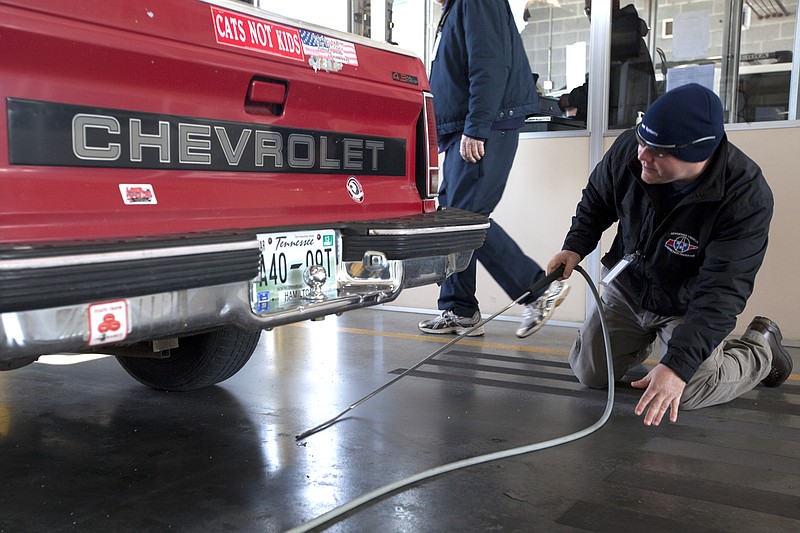NASHVILLE - A bill seeking to do away with vehicle emissions testing in Hamilton and four other Tennessee counties was overwhelmingly approved Monday evening by the state House.
The vote was 94-1. Senators are expected to consider the legislation today in the Senate Finance Committee.
Rep. Mike Carter, R- Ooltewah, and Sen. Bo Watson, R-Hixson, brought the legislation after state officials last year announced Tennessee and the affected counties had become fully compliant with U.S. Environmental Protection Agency ambient air quality standards for ozone and particulate emissions.
Hamilton, Davidson, Rutherford, Sumner, Williamson and Wilson counties all implemented EPA-approved vehicle emissions testing programs intended to lower emissions. The bill applies to the five counties under a state emissions-testing company contract. Davidson County (Metro Nashville) has set up its own testing system with its own contractor.
Carter and Sen. Bo Watson, R-Hixson, have said that with Tennessee and the six counties now in "100 percent attainment" - EPA jargon for fully compliant - the vehicle emissions testing programs are no longer needed.
The bill, which excludes Davidson County, directs the five remaining counties to go to the EPA and seek federal approval to change their State Implementation Plans and drop the annual testing many motorists detest.
An amendment added in committee makes clear that if EPA refuses, the ban on the testing would not go into effect. The counties will have to demonstrate to federal regulators that emissions are either low enough that doing away with emissions testing won't put them out of kilter with air quality standards or find other methods to make up deficiencies.
There was little discussion of the bill Monday on the House floor, but Carter said earlier that "we can't unilaterally terminate an order from EPA. We have to apply to [EPA]. What the bill does is, now that we've reached 100 percent attainment, it forces the counties to submit a plan" to withdraw.
Carter is confident that can occur, noting that EPA allowed Memphis to end its vehicle emission testing program. State regulators say that was possible because a major emissions-spewing factory shut down.
But Carter also argues that Knox County was able to avoid emissions testing to achieve compliance by hitting trucks with lower speeds outside the city of Knoxville. Hamilton County can do the same, the lawmaker said.
Hamilton County officials originally voiced concerns about the legislation. Local officials voluntarily entered the program in the early 2000s as they sought to lure a major manufacturer to the old Volunteer Army Ammunition Plant near Harrison, now the Enterprise South Industrial Park.
And that ultimately resulted in Volkswagen choosing Chattanooga for its auto assembly plant, opening the door to a number of supplier firms also locating in the area.
Under Carter's original bill, the annual $9 emissions testing fee would have gone away entirely. Most of the money went to pay for the state's hiring of a contractor to conduct the emissions testing, although $1 went to county clerks for processing.
But under the amended version of the bill, county officials would be allowed to keep up to $4 of the fee even without emissions testing. Up to $3 of that would go for items such as local officials hiring technical and legal experts to argue to EPA that testing is no longer needed.
The remaining dollar would go to county clerks for dealing with the fees that would be paid when motorists renew their annual vehicle tags.
While many vehicle owners complain about the current emissions testing program because of the inconvenience, Carter and Watson say it's especially hard on lower-income people.
A simple "check engine" light flashing can result in costs of hundreds of dollars or more to repair catalytic converters and the like, they say.
Contact Andy Sher at asher@timesfreepress.com or 615-255-0550. Follow him on Twitter @AndySher1.
